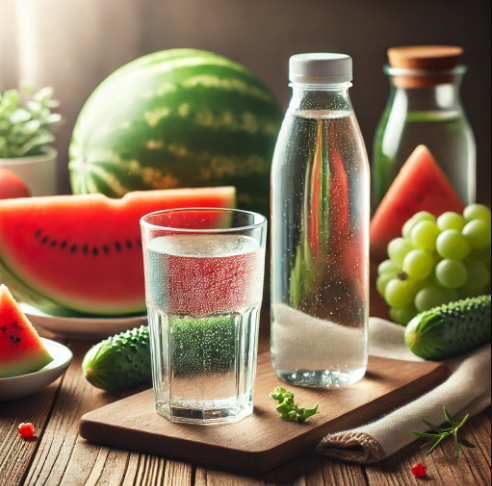Introduction:
Water is essential for life, and maintaining proper hydration is crucial for overall health and well-being. The human body is made up of about 60% water, which plays a key role in various bodily functions, including temperature regulation, joint lubrication, digestion, and the transportation of nutrients. Despite its importance, many people do not drink enough water daily, which can lead to dehydration and negatively impact physical and mental performance. This article highlights the significance of hydration, the dangers of dehydration, and tips to stay hydrated.
Key Points:
- Hydration and Physical Health:
- Water is critical for regulating body temperature, especially during physical activity. When dehydrated, the body struggles to cool down, increasing the risk of heat exhaustion and heatstroke.
- Proper hydration supports digestion by aiding in the breakdown of food and nutrient absorption.
- Water is essential for the kidneys to filter waste products from the blood and prevent the formation of kidney stones.
- Adequate water intake keeps joints lubricated, reducing the risk of joint pain and promoting flexibility, especially in athletes.
- Hydration and Mental Performance:
- Even mild dehydration can impair cognitive functions such as concentration, memory, and alertness.
- Drinking enough water can improve mood and mental clarity, while dehydration can lead to headaches, irritability, and fatigue.
- Signs and Symptoms of Dehydration:
- Common signs of dehydration include dry mouth, dark yellow urine, dizziness, and lethargy. Severe dehydration can result in rapid heartbeat, confusion, and fainting, which may require immediate medical attention.
- It is important to drink water consistently throughout the day, as thirst is not always a reliable indicator of dehydration.
- Daily Water Intake Recommendations:
- The Institute of Medicine recommends about 3.7 liters (13 cups) of water per day for men and 2.7 liters (9 cups) for women, though individual needs may vary based on activity level, climate, and overall health.
- Foods such as fruits (watermelon, oranges) and vegetables (cucumbers, lettuce) also contribute to daily hydration.
- Tips for Staying Hydrated:
- Carry a reusable water bottle throughout the day and sip water regularly, even if you don’t feel thirsty.
- Increase water intake during physical activity and hot weather to compensate for fluids lost through sweat.
- Set reminders on your phone or use a hydration tracking app to ensure you are meeting your daily hydration goals.
Conclusion:
Maintaining proper hydration is essential for optimal physical and mental performance. Water supports countless bodily functions, from regulating body temperature to aiding digestion and keeping joints lubricated. Even mild dehydration can impact energy levels, cognitive abilities, and overall well-being. By drinking enough water each day and incorporating water-rich foods into your diet, you can prevent dehydration and support long-term health. Prioritizing hydration is one of the simplest yet most impactful steps you can take toward a healthier lifestyle.
Sources (Books and Articles):
- “Your Water, Your Health: How to Stay Hydrated for Optimal Health” by Dr. Claudia Miller
- “The Water Secret: The Cellular Breakthrough to Look and Feel 10 Years Younger” by Howard Murad
- Article: “Hydration for Health: How Proper Hydration Helps Prevent Chronic Diseases” by E. Popkin et al. in American Journal of Pu
- Article: “The Role of Hydration in Cognitive Functioning” by L. Benton et al. in Nutrition Reviews
